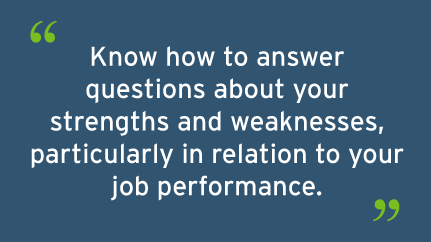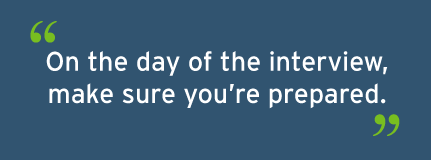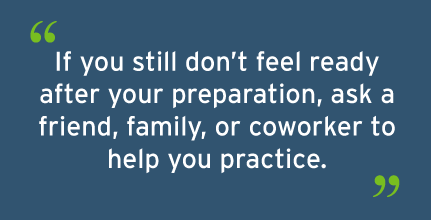I was recently discussing the topic of preparing for an interview with a friend, and he gave me this advice: "Step one: be awesome. Step two: Not needed, because you're already awesome."
These are words to aspire to, but they don’t offer much practical advice. What do you need to do to "be awesome" in an interview? Conventional wisdom says that the best way to nail an interview is to prepare – so it follows that the way to be awesome is through preparation.
Prior to the interview, there are three main areas you can focus on: research, self-reflection, and logistics.
Research provides you with the context of your discussion, allows you to come into the conversation with some background knowledge about the organization, and provides you with material to ask intelligent and thoughtful questions. Setting some time aside for self-reflection allows you to have answers to questions asked of you. Figuring out the logistics of the interview ahead of time will help it go more smoothly and avoid any unnecessary delays or complications.
1. Do your research.
Ahead of time, do some research to find out more about the organization that’s going to interview you. One of the best places to start is the client's website.
On the website, you’ll be able to find basic information like the size of the healthcare organization, its location, its mission statement, and details like whether multiple hospitals are acting together as a system. A Google search for recent news articles can be a great source of information as well.
All this information can help you try to build a connection. You will have a short time (sometimes as little as 30 minutes) to find a way to connect.
 As you do your research, try to come up with at least three questions you can ask the client. This shows that you have put some time into preparing and that you're taking the interview seriously. You may not get the opportunity to ask the questions – or you may find you have better questions to ask as you go – but doing the research can help put you in the right frame of mind.
As you do your research, try to come up with at least three questions you can ask the client. This shows that you have put some time into preparing and that you're taking the interview seriously. You may not get the opportunity to ask the questions – or you may find you have better questions to ask as you go – but doing the research can help put you in the right frame of mind.
2. Self-reflect on your strengths, weaknesses, and experience.
During your interview, you may be faced with the dreaded question, “What are your biggest strengths and weaknesses?" It's a good idea to have a prepared response in case you come across an interviewer who swears by the classics.
But even if you aren't asked that question, you should know how to answer questions about your strengths and weaknesses, particularly in relation to your job performance. Make sure you have a handle on areas where you’ve exceled in the past, areas where you’ve struggled, and examples and reasons for both. This applies to work skills in general, but also to the application you are going to be supporting.
Here are a few examples of questions to think about as you prepare:
- "Can you describe a situation in which you tackled a particularly hard issue and were successful?"
- "What areas of your application are you strongest in?"
- "What are your favorite parts of the application or Epic?"
- "What is something you could work on?"
- "Why do you want this job?"
You’ll probably get some questions you don’t expect, but if you’ve taken the time to think about yourself, you’ll find that coming up with articulate responses is much easier. Providing examples can help cement the points you are trying to make in the minds of your interviewers. Most interviewers aren't trying to trick you or to make you say something wrong; they’re simply trying to gauge your personality and how you handle yourself in a professional setting. 
If you have time in advance of your interview, you can work on tackling some of the knowledge gaps you have in your application. At a minimum, you should be aware of the latest and greatest functionality and areas where you are less familiar. Having a surface-level knowledge is always preferable to having to respond, "I don't know what that is."
3. Make sure you know the logistics in advance.
Before the interview, make sure you have all the details regarding time, place, and method of conversation ironed out. For instance:
- Make sure you are on the same page about the time zone. If possible, it's a good idea to confirm that in an email.
- You should know who is calling whom and at which number.
- Offer in advance to send an updated copy of your resume (even if they already have it).
On the day of the interview, make sure you're prepared. Give yourself enough time; if necessary, block off time both before and after the interview to make sure you’re not running late or rushed.
 You should have a quiet and comfortable area set aside where you won’t be interrupted. If you are interviewing from your home, have a plan for your kids and pets. Even if your dog is usually a saint, an unexpected UPS delivery could cause an interruption. The space you choose should be free from distractions.
You should have a quiet and comfortable area set aside where you won’t be interrupted. If you are interviewing from your home, have a plan for your kids and pets. Even if your dog is usually a saint, an unexpected UPS delivery could cause an interruption. The space you choose should be free from distractions.
You should also make sure you have a few things on hand for the interview itself. Make sure your phone is charged and that your chosen location has good service. If you are relying on your computer for anything, make sure you have a connection and that you have a charger on hand. It's also a good idea to print off a resume for yourself. Some interviewers will want you to walk them through your resume, which will be much easier to do if you aren't trying to do it from memory. You should also have a glass or bottle of water on hand in case your throat gets dry.
***
It’s normal to feel anxious about going to a job interview, but a little preparation can go a long way in making you feel calm, comfortable, and ready to talk about anything you’re asked. If you still don’t feel ready after your preparation ask a friend, family member, or co-worker to help you practice. At the end of the day, remember that you’re an experienced consultant who’s interviewing because you’re great at your job. When it comes to the interview, you will be awesome.